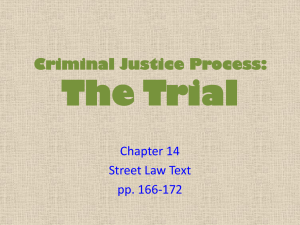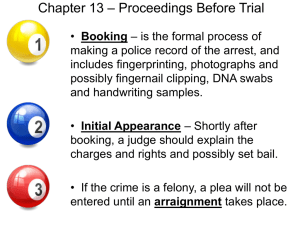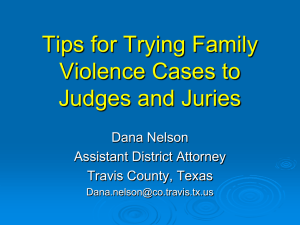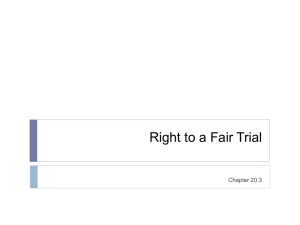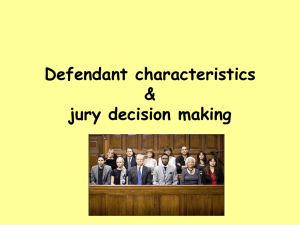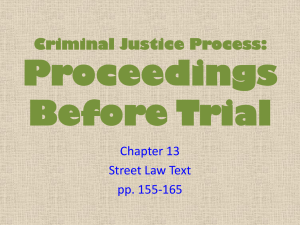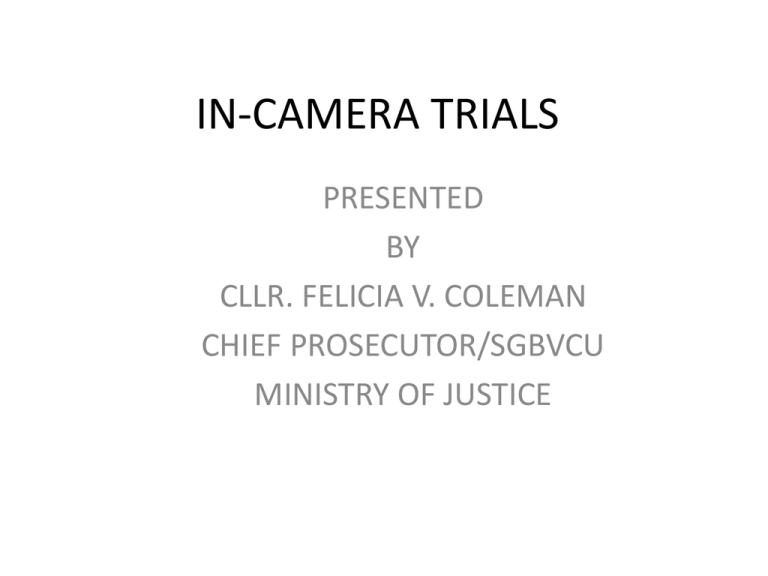
IN-CAMERA TRIALS
PRESENTED
BY
CLLR. FELICIA V. COLEMAN
CHIEF PROSECUTOR/SGBVCU
MINISTRY OF JUSTICE
OUTLINE
1. OBJECTIVES
2. BACKGROUND TO IN-CAMERA HEARINGS/TRIALS IN LIBERIA
3. DEFINITION OF IN-CAMERA TRIAL
4. IN- CAMERA PROCEDURE
5. WHO IS ENTITLED TO IN- CAMERA HEARING?
6. CHALLENGES WITH THE USE OF IN-CAMERA TRIALS
7. WHAT HAS THE SUPREME COURT ABOUT IN-CAMERA TRIALS.
OBJECTIVES
• At the end of the presentation, the
participants will achieve the following:
1. Understand the importance of in-camera
hearing;
2. Acquire the knowledge in conducting a trial
using the in-camera proceedings;
3. Identify the cases that will require in-camera
hearing.
BACKGROUND OF IN-CAMERA
TRIALS/HEARINGS IN LIBERIA
• VISIT TO COURTS WHERE IN-CAMERA TRIALS
ARE HELD;
• PASSAGE OF THE NEW RAPE LAW;
• PASSAGE OF THE LAW CREATING CRIMINAL;
COURT “E”( SEXUAL OFFENSE COURT);
• ESTABLISHMENT OF THE SEXUAL OFFENSE
COURT;
• CONFIRMATON OF IN-CAMERA HEARING BY
THE SUPREME COURT OF LIBERIA.
WHAT IS IN-CAMERA TRIAL?
• Judicial proceedings conducted in a Judge’s
Chamber or in private, or away from the
public with sealed records that maybe
expunged;
• Behind closed doors for cases involving:
(i) official secrets,
(ii) Rape, other sexual offenses
(iii) child molestation,
(iv) juveniles,
IN-CAMERA PROCEEDINGS
• After the Grand Jury determines there is probable
cause that a crime has been committed, a true
bill is given and the indictment is sent to the
Circuit Court, in Montserrado County Criminal
Court “E”.
• A Writ of Arrest is issued by the Clerk of Court
and served on the Defendant to bring him/her
under the jurisdiction of the Circuit Court
• The Defendant is brought to the Court and
arraigned to determine his/her plea. Guilty or not
guilty.
IN-CAMERA PROCEEDING COND.
• If the Defendant(s) pleads guilty, a date is set for
the State to present evidence or if a plea bargain
is reached the procedure for a plea bargain
agreement is arranged.
• If the Defendant(s) pleads not guilty, a date is set
for the Trial.
• The State shall make disclosure to the Defendant.
• A Pre-Trial Conference is held and all documents
that are not challenged by the Defendant are
marked by the Court.
IN-CAMERA PROCEEDINGS COND.
• A date is set for the trial.
• If jury trial is requested, the jury is selected.
• The State produces its evidence.
i. open statement;
ii. each witness is directed and cross-examined under
the rules of evidence using the solicitation method;
iii. State rests with the production of evidence.
• The Defendant produce evidence if he/she so desires. If
the Defendant chooses to produce evidence, he/she
begins by:
IN-CAMERA PROCEEDINGS COND.
i. Defendant make a open statement;
ii. Each witness is directed and cross-examined
using the solicitation method under the rules of
evidence;
iii. The Defendant rests with the production of
evidence;
• The State may produce rebuttal evidence
(produce evidence to rebut any evidence that
was produced by the Defendant that is not true).
IN-CAMERA PROCEEDINGS COND.
• The State Makes a closing argument;
• The Defendant makes a closing argument;
• The Jury is charged on the law relating to
sexual violence and any other laws as
requested by the State and the Defendant;
• The Jury goes to the room of deliberation;
• When a verdict is reached the Judge is
informed and the jury returns to the court and
the Clerk of Court reads the Jury’s verdict.
IN-CAMERA PROCEEDINGS COND.
• If the State wins, the Defendant may except and
announce an appeal to the Supreme Court to
review the proceeding during trial.
• The Defendant has to complete the appeal
process within statutory time or the appeal could
be dismissed.
• After the SCT. Hears the appeal, it may affirm the
verdict of the jury, and modify the final judgment;
affirm the final judgment or reverse the judgment
and remand for new trial or release the
Defendant.
OTHER REMEDIES FOR VICTIMS
• SECTION 25.3 (e) & (f) of the Act creating Criminal Court “E”
Provides:
(i) The Court shall have authority to prohibit the publication of
the names and addresses of rape victims;
(ii) The Court shall have authority to expunge the names of
victims from the public records;
(iii) The Court shall have authority to grant interim relief to
minimize risks to victims;
(iv) Where children are involved, the Court may place them in
protective homes or custody.
WHO IS ENTITLED TO AN IN-CAMERA
PROCEEDING
• Section 5 (a) of the Act to Amend the New Penal Code
chapter 14 Section 14.70 and to provide for Gang Rape
says;
“ The trial of all cases under section 14.70 shall be held
in camera.
• Section 25.3 ©, Procedure of the Act Creating
Amending Title 17 of the Revised Code of Laws to be
Known as Chapter 25 Establishing Criminal Court “E”
of Mont Co. and Special Divisions of the Circuit Courts
of Other Counties provides that:
• “Except for cases of Rape, which under section 14.70 of
the Penal Law
WHO IS ENTITLED TO IN-CAMERA
PROCEEDING
are required to be held in camera, the trial of
Sexual Offence cases may be held in camera
where the alleged victim is under 18 years of
age and the protection of the victim warrants
an in camera trial; provided that other sexual
offences trials may be held in camera where
requested by the State and where the court
determines that the victim or a witness
warrants protection”.
CHALLENGES IN THE IN-CAMERA
TRIALS
• There is only one court in Liberia with the
facilities for in-camera trials;
• In-Camera Proceeding is new in the
jurisdiction of Liberia;
• The procedure is new to lawyers, judges,
Court Officers and the public;
( Let participants name other challenges).
WHAT DOES THE SCT HAS TO SAY
ABOUT IN-CAMERA TRIALS
• The intent of in camera testimony is to PROTECT THE
IDENTITY of a sex abused victim;
• The procedure seeks to remove the actual and
psychological fears associated with a child abuse victim
facing an alleged perpetrator;
• The law authorizes in camera trials when required by the
State and where the Court determines that the victim or
witness warrants protection;
• Intended to remove the grave prospect of easy
identification with the risks of making the victim a
community stigma and a subject of public scandal;
WHAT DOES THE SUPREME HAS TO
SAY ABOUT IN-CAMERA TRIALS
• Liberian courts has a duty to remove the
names of sex victims from the minutes of
court to ensure strict confidentiality and non
recognition of victims;
• A victim’s name shall not be a subject of
public information and knowledge;
QUESTIONS AND ANSWERS
• THANK YOU FOR THE OPPORTUNITY TO SHARE
MY KNOWLEDGE AND EXPERIENCE ON IN
CAMERA TRIALS IN LIBERIA



